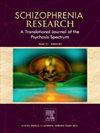Social stress in schizophrenia: Unique contributions to social cognition and social functioning
IF 3.6
2区 医学
Q1 PSYCHIATRY
引用次数: 0
Abstract
Schizophrenia-spectrum disorders have been associated with heightened stress sensitivity, which can worsen prognosis, functioning, and quality of life. However, more research is needed to determine whether different types of stress impact specific functional domains. This study used the Psychological Stress Index (PSI)—a self-report instrument designed and validated to measure perceived stress in psychosis—to delineate the unique contribution of social versus non-social stress to social functioning and social cognition. Fifty-nine participants with schizophrenia/schizoaffective disorder and fifty non-clinical controls completed the PSI and a battery of social functioning and social cognition measures. Elevated social stress statistically predicted worse performance on an emotion recognition task and worse interviewer-rated social functioning, over-and-above non-social stress. Higher social stress also statistically predicted worse interviewer-rated social functioning over-and-above performance on emotion recognition and theory-of-mind tasks. These results provide promising evidence that examining social stress separately from non-social stress provides unique information about social difficulties in schizophrenia-spectrum psychopathology. Examining social stress and other specific forms of stress may improve understanding of stress sensitivity in this population and better inform treatments aimed at improving functioning.
求助全文
约1分钟内获得全文
求助全文
来源期刊

Schizophrenia Research
医学-精神病学
CiteScore
7.50
自引率
8.90%
发文量
429
审稿时长
10.2 weeks
期刊介绍:
As official journal of the Schizophrenia International Research Society (SIRS) Schizophrenia Research is THE journal of choice for international researchers and clinicians to share their work with the global schizophrenia research community. More than 6000 institutes have online or print (or both) access to this journal - the largest specialist journal in the field, with the largest readership!
Schizophrenia Research''s time to first decision is as fast as 6 weeks and its publishing speed is as fast as 4 weeks until online publication (corrected proof/Article in Press) after acceptance and 14 weeks from acceptance until publication in a printed issue.
The journal publishes novel papers that really contribute to understanding the biology and treatment of schizophrenic disorders; Schizophrenia Research brings together biological, clinical and psychological research in order to stimulate the synthesis of findings from all disciplines involved in improving patient outcomes in schizophrenia.
 求助内容:
求助内容: 应助结果提醒方式:
应助结果提醒方式:


